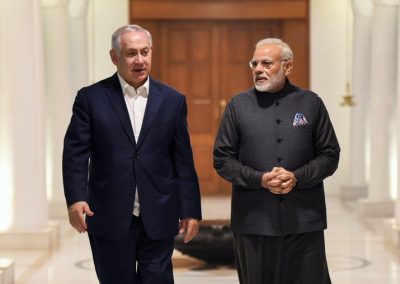India Doubles Down on Its Military Alliance with Israel

India’s $100 million purchase of 1,000 Barak-8 medium-range surface-to-air missiles and an as-yet unknown number of anti-tank Spike missiles proves that the South Asian state is doubling down on its military alliance with “Israel” and giving its old partner Russia a run for its money.
The Indian-“Israeli” military alliance is one of the least talked about but most strategically impactful developments of contemporary Eastern Hemispheric geopolitics and it’s just intensified after New Delhi made a decision earlier this week to double down on this dimension of its recent pro-Western pivot. The South Asian state is already serving “Israeli” strategic objectives vis-a-vis Iran by submitting to America’s unilateral sanctions pressure and discontinuing its purchase of Iranian oil, which will sooner than later hit the Islamic Republic’s budget real hard and exacerbate its ongoing economic crisis, and its earlier testing of a surface-to-air missile that it jointly produced with the self-professed “Jewish State” also sent an unmistakable signal of intent. Shattering any ambiguity about which side it’s on in the New Cold War, India also unprecedentedly voted together with “Israel” to deprive a Palestinian NGO of consultative status at the UN and dispatched naval and air assets to the Gulf in an operation that’s obviously anti-Iranian to the core.
It therefore shouldn’t have been too surprising that it just agreed to purchase 1,000 Barak-8 medium-range surface-to-air missiles for $100 million alongside an as-yet unknown number of anti-tank Spike missiles despite the latter supposedly failing previous trials. “Israel” defied all expectations to become India’s second-largest weapons supplier over the past half-decade, even surpassing the US but still trailing far behind Russia, which made Tel Aviv the world’s eight-largest weapons exporter during that period according to the Stockholm International Peace Research Institute (SIPRI). “Israeli” and the American military sales to India together account for slightly less than half of what Russia provides to the South Asian state, but the writing is on the wall as Moscow’s share of the Indian military marketplace continues to decline in the face of unrelenting competition from its aforementioned two rivals for the loyalty of the world’s second-largest arms purchaser. That explains why Russia is so desperately offering its old partner a slew of deals in an attempt to stem the speed of its sales decline and therefore ensure that its budgetary revenue isn’t disproportionately offset by it.
Russia and “Israel” are indeed allies, but so too are “Israel” and India, and Tel Aviv knows that its heated arms competition with Moscow over New Delhi’s ultra-profitable military marketplace isn’t going to have any adverse effect on their excellent bilateral relations because it’s seen by both parties as an apolitical affair that’s “strictly business”. Even so, Russia would of course prefer for India to purchase its wares instead of “Israel’s”, but the decision to patronize its rival instead is a purely political one that speaks to the sincerity of the South Asian state’s pro-Western pivot in recent years. There’s no more surefire way of virtue signaling any state’s allegiance to the West than to spend billions of dollars buying “Israeli” weaponry instead of Russia’s, which must undoubtedly please the US while simultaneously sending chills down the Iranians’ spines after the Islamic Republic horrifyingly realizes that what it previously regarded to be one of its closest partners was really an American-“Israeli” ally this entire time that was just waiting for the right time to go public with its pivot.
*
Note to readers: please click the share buttons above or below. Forward this article to your email lists. Crosspost on your blog site, internet forums. etc.
This article was originally published on Eurasia Future.
Andrew Korybko is an American Moscow-based political analyst specializing in the relationship between the US strategy in Afro-Eurasia, China’s One Belt One Road global vision of New Silk Road connectivity, and Hybrid Warfare. He is a frequent contributor to Global Research.
Featured image is from India TV

